|
|
|
Sort Order |
|
|
|
Items / Page
|
|
|
|
|
|
|
| Srl | Item |
| 1 |
ID:
108517


|
|
|
|
|
| Publication |
2011.
|
| Summary/Abstract |
The article posits that in global politics, and in the scholarly subfield of international ethics, we should begin moving away from intentions and intentionality when considering accountability. Intentionality is problematic in at least three respects - analytically it is hard to determine; normatively it is difficult because we must invest our trust in authority; and it comes coupled with the problematic relationship between means and ends. This article explores these issues through three sections. First, it engages some of the purposes but also overall problems with 'intentions' in world politics (and especially the debate as it has progressed in the field of international ethics). The second section reviews recent theses on accountability, before moving towards an alternative aspect of accountability which already exists in world politics, termed in this article 'the accountability of the scar'. This last form of accountability refers to the physical damage produced by violence, with reference to three domains - the anthrobiological, the architectural, and the agentic sphere. Two examples of the scar come to us from the different context of the Emmett Till case of 1955 and the more fluid, and recent case of Iranian protestor Neda Agha-Soltan.
|
|
|
|
|
|
|
|
|
|
|
|
|
|
|
|
| 2 |
ID:
087583
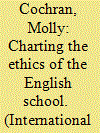

|
|
|
|
|
| Publication |
2009.
|
| Summary/Abstract |
This article aims to advance our understanding of the development of English School thinking on international ethics by outlining three phases of ethical inquiry within the British Committee. The article argues that, throughout the life of the Committee, its outlook was conditioned by a pervading moral skepticism, which was reflected in the School's commitment to a "middle-ground ethics"; however, at various times the Committee members' views changed about how maximalist the "good" could be that oriented this ethical position. Awareness of this ebb and flow helps us better understand Hedley Bull's characterization of the ethics of pluralism and solidarism within the School as well as the precise challenge contemporary English School theorists face if they are to move beyond the normative cul-de-sac that British Committee members encountered in each phase of their ethical discussions.
|
|
|
|
|
|
|
|
|
|
|
|
|
|
|
|
| 3 |
ID:
171954
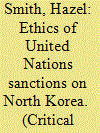

|
|
|
|
|
| Summary/Abstract |
If the legal foundation and political consensus underpinning United Nations resolutions suggests that North Korea's denuclearization can be understood as a just cause, were the means used by the United Nations also just? This essay draws on jus in bello analogies to analyze UN sanctions via standard ethical criteria of effectiveness, necessity and proportionality. It shows that UN sanctions did not fulfill the effectiveness criterion as they were never likely to result in the denuclearization of North Korea. The necessity condition was strained as the alternative instrument of diplomacy was not utilized in a sustained manner. Expanded sanctions from 2016 did not distinguish between the military and civilian economies. Stringent energy sanctions introduced in 2017 contributed significantly to a precipitous fall in agricultural production in 2018 such that the country could no longer feed about a third of the 25 million population. Post-2016 UN sanctions did not meet the proportionality criterion as they jeopardized the food security of millions of innocents. The DPRK government has primary responsibility for the welfare of its citizens but this assumption does not abrogate the responsibilities of others. Broad UN sanctions on the DPRK are neither effective nor proportionate and are, therefore, unethical.
|
|
|
|
|
|
|
|
|
|
|
|
|
|
|
|
| 4 |
ID:
092083
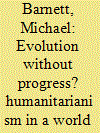

|
|
|
|
|
| Publication |
2009.
|
| Summary/Abstract |
Many theories of international relations contain a narrative of progress and explain that progress with reference to evolutionary imagery. This article examines critically: the relevance of Darwinian and Lamarckian models of international relations to the evolution of international ethics and institutions; and the possibility that the ethics and norms are likely to be more consistent with existing world orders than challengers to it. Specifically, this article draws from evolutionary social science and organizational theory to develop a framework to explore the initial diversity of the meaning and practices of humanitarianism; how the combination of environmental mechanisms and organizational culture led many humanitarian agencies to adapt to their environment in ways that incorporated politics; and the subsequent countermovement by some agencies who wanted to purify humanitarianism. I then apply this framework to explain the recent history of four international aid agencies. I conclude with several observations regarding how the model as applied to these cases allows us to examine critically the selection mechanisms that do and do not account for ethical change and how scholars of international norms, ethics, and progress should be attentive to how principled actors are creatures of the world they want to transform.
|
|
|
|
|
|
|
|
|
|
|
|
|
|
|
|
| 5 |
ID:
103254
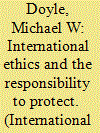

|
|
|
|
|
| Publication |
2011.
|
| Summary/Abstract |
I examine the roots of "Responsibility to Protect" in international ethics. International responsibility to protect is as a whole at odds with international law, but deeply familiar to Liberal international ethics. But, controversially, I argue that even the Realist and Marxist traditions include commitments to human respect that make humanitarian concerns far from foreign. I then explore how it evolved out of the crisis in Kosovo and the question of its policy significance today in cases in which it has been invoked, ranging from Myanmar to Kenya and Guinea - sometimes explicitly, sometimes implicitly, successfully and not. My conclusion is that R2P has contributed to the increasing pluralism, contested and contestable, of the normative architecture of world politics, and thus has produced confusion. But, this confusion may reduce as RtoP norms are accumulated in customary law and reshape the discourse of international ethics. In any case, where the alternative to pluralism is clarity that either abandons vulnerable populations or imposes unrealistic expectations of enforced human rights, confusion is a step forward, a resource for responsible policy and the best we are likely to get if we continue to care about both vulnerable populations and national sovereignty.
|
|
|
|
|
|
|
|
|
|
|
|
|
|
|
|
| 6 |
ID:
114439
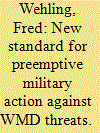

|
|
|
|
|
| Publication |
2012.
|
| Summary/Abstract |
International law clearly requires an imminent threat of attack as a justification for the preemptive use of military force. However, the standard definition of an imminent threat was derived centuries before the development of nuclear, chemical, or biological weapons or ballistic missiles and other delivery systems that can reach their targets in a matter of minutes. Any use of force to alleviate threats posed by weapons of mass destruction (WMD) prior to tactical warning of the actual launch of such weapons falls into the legally and ethically controversial category of "anticipatory self-defense," leaving decision makers potentially liable to prosecution for war crimes. Effective and ethical enforcement of nonproliferation therefore demands a standard for imminence of threat broad enough to allow military action as a last resort but sufficiently restrictive to prohibit indiscriminate action against suspected WMD programs. Following a critical review of selected literature and cases on preemption, the author proposes a new standard for preemptive military action: the existence of operational WMD, or a clandestine program to develop WMD, in contravention of international law. The author discusses the implications of this new proposed standard, which at the time of writing would permit preemptive attack against WMD-armed terrorist groups but prohibit it against all states except Iran and possibly North Korea.
|
|
|
|
|
|
|
|
|
|
|
|
|
|
|
|
| 7 |
ID:
121857
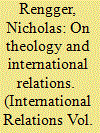

|
|
|
|
|
| Publication |
2013.
|
| Summary/Abstract |
In previous periods, scholarship about international relations often drew on writing in theology, as well as more familiarly, history, law or philosophy. Some very influential scholars of international relations - think of Rheinhold Niebuhr, Martin Wight and Herbert Butterfield - were extremely widely read in theological topics, and their theological concerns influenced their understanding of international relations. This article looks at some contemporary writing with overtly theological concerns and asks how might contemporary international relations scholarship benefit from an engagement with contemporary philosophical and political theology.
|
|
|
|
|
|
|
|
|
|
|
|
|
|
|
|
| 8 |
ID:
127800
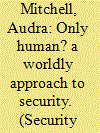

|
|
|
|
|
| Publication |
2014.
|
| Summary/Abstract |
Harm does not happen to humans in isolation, but rather to worlds composed of diverse beings. This article asks how worlds and the conditions of worldliness should be framed as 'subjects of security'. It explores three possible pathways: rejecting anthropocentrism; expanding existing ethical categories; and adopting 'new materialist' ontology and ethics. Ultimately, it argues for a fusion of the key elements of each of these pathways. This offers the basis for a new concept of harm ('mundicide') specifically intended to reflect harms to worlds and the conditions of worldliness. The value of this concept is demonstrated in the light of an empirical example: the 'Rainforest Chernobyl' case. The article concludes that a worldly approach is necessary if we are to capture the full enormity of the harms confronted by international security.
|
|
|
|
|
|
|
|
|
|
|
|
|
|
|
|
| 9 |
ID:
079474
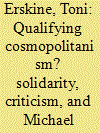

|
|
|
|
|
| Publication |
2007.
|
| Summary/Abstract |
For some, cosmopolitanism is a deeply troubling, even dangerous, ethical position. An 'embedded cosmopolitan' variation on this position would strive to take seriously the apprehensions of these critics by eschewing the impartialist perspective to which it is conventionally tied. Specifically, this proposed alternative would adopt a modified version of the particularist moral starting point espoused by so-called 'communitarian' political theorists. In order to retain its ethical cosmopolitan credentials, such a stance would have to achieve a moral purview that left no-one, whether compatriot or foreigner, ally or enemy, beyond either concern or comprehension. Trying to construct this qualified cosmopolitanism is a difficult and daunting task. By analysing the various attempts of the American political philosopher Michael Walzer to reconcile a radically situated account of morality (his 'view from the cave') with an inclusive and cross-culturally critical moral purview, this article aims to map the most promising route towards an embedded cosmopolitan position. At the same time, it endeavours to pay due attention to a much broader range of Walzer's writings than is generally acknowledged within the study of international relations
|
|
|
|
|
|
|
|
|
|
|
|
|
|
|
|
| 10 |
ID:
113740
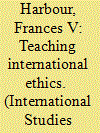

|
|
|
|
|
| Publication |
2012.
|
| Summary/Abstract |
There are important differences between 1985 and today in the way we think about the subject of international ethics as political scientists, the resources we have available for students, and in the attitudes of students toward ethical issues. This paper compares the experience of teaching international ethics in 1985 with teaching the same course in the twenty-first century. The current environment is more accepting of international ethics as a field of academic inquiry, and much richer in terms of resources.
|
|
|
|
|
|
|
|
|
|
|
|
|
|
|
|
| 11 |
ID:
164833
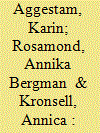

|
|
|
|
|
| Summary/Abstract |
A growing number of states including Canada, Norway and Sweden have adopted gender and feminist-informed approaches to their foreign and security policies. The overarching aim of this article is to advance a theoretical framework that can enable a thoroughgoing study of these developments. Through a feminist lens, we theorise feminist foreign policy arguing that it is, to all intents and purposes, ethical and argue that existing studies of ethical foreign policy and international conduct are by and large gender-blind. We draw upon feminist International Relations (IR) theory and the ethics of care to theorise feminist foreign policy and to advance an ethical framework that builds on a relational ontology, which embraces the stories and lived experiences of women and other marginalised groups at the receiving end of foreign policy conduct. By way of conclusion, the article highlights the novel features of the emergent framework and investigates in what ways it might be useful for future analyses of feminist foreign policy. Moreover, we discuss its potential to generate new forms of theoretical insight, empirical knowledge and policy relevance for the refinement of feminist foreign policy practice.
|
|
|
|
|
|
|
|
|
|
|
|
|
|
|
|
| 12 |
ID:
055321
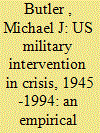

|
|
|
|
|
|
|
|